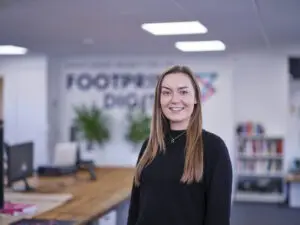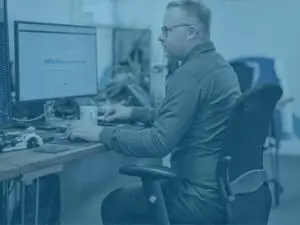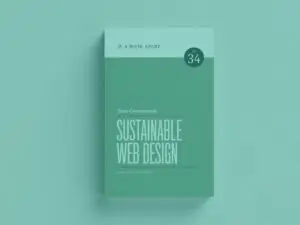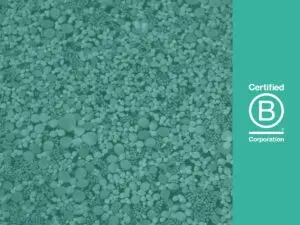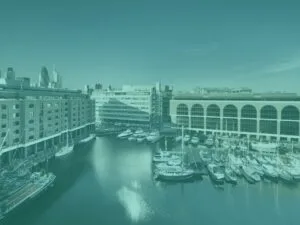
What can brands do to help minimise their digital carbon footprint?
This is part one of a three part series taken from February’s ‘Footprint Digital Presents…The Sustainable Future of Digital’. In this part, our host Carl and panelists Parry, Bailey, David, Sophie & Graham discuss actions that people can take for digital sustainability.
About the Panelists:
Parry – Deputy CEO of What’s Possible Group
Bailey – Business Development Manager at Footprint Digital
David – Co-founder of Net Zero International
Sophie – Senior Associate at law firm RPC
Graham – Senior Partner Manager at Trustpilot
Parry: Just setting the scene a little bit, advertising is a £600 billion a year global industry, there are very few people on the planet who aren’t impacted in some way by advertising. So, in terms of the ability to have a societal effect, advertising and marketing have a huge opportunity. I think brands can, and should, make a positive difference.
When you think about the digital carbon footprint, I think it’s worth painting the picture of digital versus other types of media. I think there’s a tangibility impact. With things like print media, people might think of chopping a tree down or putting something in the bin, and because of that tangibility the print industry has really had to get its act together.
So, in Europe, we plant far more trees than we chop down, the size of forests in Europe have grown by the size of Portugal over the last ten years, as a business everything that we print is on FSC paper, we work with the Woodland Trust, we print with vegan inks, we’ve sustained 66 football fields worth of forestry over the last year, so because of that tangibility, that industry has had to make a positive impact.
In terms of sustainability, Sky is known as being the most sustainable media owner in Europe, so it was carbon neutral back in 2006-ish, all the big UK broadcasters – Sky, ITV, and Channel 4 have all committed to Net Zero by 2030, and again that’s because a lot of the things they do are very tangible, you as the consumer can see them.
You then move on to digital, and it’s not obvious what the impact is, and yet the carbon impact is huge. On a daily basis, Facebook is letting out enough carbon to drive to the moon 13 times.
You’d obviously have to build the roads first which would also have an impact! YouTube’s emissions are equal to driving to the moon 62 times, and email which is the really interesting one, and I know there’s loads of debate about it, but the reckon the average email costs 4 grams worth of carbon and about 306 billion emails are sent on a daily basis so that’s 1.2 trillion grams of carbon everyday. So, we have a LOT to do in terms of the digital industries.
Bailey: Carl’s talked about this before, that the internet is about 4% of all carbon emissions, but when we think about that, that’s the internet of things and even that seems hard to fathom. Where do you even start?
Parry, you’ve touched on email, you’ve touched on YouTube, all of these things that seem so macro. But there are individual things that we can be looking at on a smaller scale especially when it comes to businesses, we need to be thinking about where you actually have control and where you could be making those changes.
That’s why at Footprint Digital we were thinking ‘okay, instead of being bogged down by the depressing fact that carbon emissions are happening, climate change is the reality, what can we do in terms of our skillsets to be able to tackle this and give people the tools they need to be doing this.’ Since we specialise in SEO, we’re working directly with people’s websites so we’re thinking, okay: paper is tangible, sending an email doesn’t feel like you’re getting your hands dirty and when you’re going onto Google and searching for something, it doesn’t seem like you’re letting our emissions per se, but any time you do a Google search (or a search with another engine!) that is letting out emissions.
Any time you visit a webpage, the average webpage is about 0.5 grams of carbon per visit, but if you think about how many people are doing that on a daily basis, and businesses having X amount of people coming to their websites it all adds up. You’re not going to want to stop people coming to your website as a business, but there are things that you could be doing to minimise the impact.
When we think about websites there’s a lot you could be doing. Images have a major impact, there’s lots that we could be doing in terms of updated images. We know about PNG, we know about JPEG, but there are things that we can do from a web friendly perspective like AVIF and Web P which makes images accessible when they need to be rather than all the time. But then there’s also optimising the size of the images, If you have your logo on your page and it’s always going to be 400×400 pixels, upload it like that instead of having it 1200×1200 because the more that you’re asking the server to upload, the more energy it takes.
It’s really timely, the BBC actually released a documentary on Panorama last night about the effects of the cloud and where our data is living on servers, and it’s massive.
These data centres are generating an immense amount of heat, but there’s so much that we could be doing at a business level to minimise the impact that it’s sending that way because if you think about a website, there’s the webpage that you’re seeing itself, the front end, and then where the data is living and where it’s travelling from, so the data centres are accessing it through physical tubes than run through the ocean so if you have a UK website and you’re serving UK customers if you have a web server that’s actually based in the USA for example, you’re telling the web server to send all of that information to the USA, to then come back.
So, even thinking about where your website is hosted can help you minimise your impact. You could even be running it on renewable energy, so there are some things that feel like such minute changes to the website that actually don’t change the user experience, but do minimise the impact tenfold on the environment.
That all may be news to some of you, or you may already have known it, but I think the onus really shouldn’t be on the consumer, it absolutely needs to be on the business because it’s in their best interests not only from a sustainability standpoint, but by reducing website waste and minimising the time it takes for you pages to load aids your SEO, the faster a page loads the more people you’re likely to have stick around to interact with it.
Google also recognises that that’s good so they’ll be ranking you higher on search engine results, too. So, you have a business case for this as well because it will only increase your conversions.
But if we’re thinking even further, we don’t want to just get lots of traffic and people to our website, minimise the size of images and all of that. We want to really think about the intent of people who are online.
You want to find people at the right point in their customer journey, so if we think about search engine optimisation as a whole and the content we create, who our target audience is, then you’re going to create more purposeful interactions online so that people spend less time on there, connect with you quicker and then it’s a win win for everyone.
Parry: What I love about what Bailey’s saying is that the discussion around being sustainable is often about it being a cost, whereas everything you’ve talked about there is good for your business – faster loading websites, quicker conversions to sale – so if you get creative you can have a positive impact on sustainability, and a positive impact on your P&L.
I think wherever we can do that, change is going to move faster. As marketers, and as brands, we can influence media owners to go faster on this journey. You can make more sustainable choices, you can demand more from media owners, you can turn off Google and use Ecosia which gives 100% of its profits to charity, 80% into planting trees.
There’s brilliant businesses like Good-loop who are a video platform who I think gave around £2.5 million to charity last year, but the advertising works. Goodnet is another one who are an ad network but they only put ads on sites which are good for the environment, good for physical and mental health as well. So, you can make those positive changes which will positively impact your P&L but also have a positive impact on sustainability.
Bailey: Absolutely, even with that because if you have less data transferring to the server then it can minimise the financial costs involved. When you’re thinking about digital sustainability there are some really core benefits – there’s sustainability which should be priority number one, there’s a good cost benefit, and it’s good for your search engine optimisation.
But ultimately, it does need to be on the businesses because they are going to have to be making those changes so if we can help educate people on where they could be doing those things then that’s really necessary.
When we talk about the digital carbon audit that we do, it absolutely helps people not only find the true weight of their website but also marrying that up with Google Analytics data to see where the priority areas are for improvement and allows you to track those changes because companies are going to have to be reporting on their carbon emissions much more.
A lot of businesses already are reporting on the tangible emissions, but digital sustainability is a known subject, and the time is not very far away where people are going to be having to report on this stuff so being able to have the power to measure it, make it tangible and actually minimise it is great.
Parry: There are brilliant organisations who are working on that measurability, so the IPA are doing loads of work on this and I think we’re not that far off being at the point where a media plan can talk about the financial costs but also the environmental costs of that plan.
David: The only thing I’d add to that is, first tip of the evening, unsubscribe from emails you no longer want! I always think, Black Friday, you get all those emails from all of those companies that have somehow got your email address, unsubscribe, you’re saving 4g of carbon for each one sent. Lots of us doing that, small actions make a big difference over a period of time.
Bailey: Following that, that can also seem like a bit of a daunting thing to unsubscribe from everything because you think ‘what am I subscribed to?!’ There’s an incredible website called Cleanfox.io which will tell you everything that you’re subscribed to and unsubscribe you from it, and delete everything for you.
Sophie: I was also going to say, and this may be a slight tangent, I think there’s an interesting question here about what content creators and media platforms can change in terms of the messages they’re showing to consumers.
How can we put, front of stage, low carbon habits like cycling rather than using a car. If you’re developing a TV show or some content, how can you start to influence consumers to reduce the carbon that they emit as part of their everyday lifestyle. I think that’s something the advertising and media world should be considering.
Parry: That’s a brilliant point because everyone will have seen on TV ads, the diversity of people in those ads has changed massively, and it’s a really big conversation in the industry to make sure that’s happening.
I don’t think what you’re saying is a debate that’s currently happening. I know that Sky have got a £2 million fund to encourage sustainable businesses, but actually I haven’t heard any debate saying we should be showing people cycling rather than driving to work for example.
Graham: It’s a really big marketing tool, it can be used massively by business owners, who can use that sustainability and the changes that they’re adopting to flow through all of their marketing strategy.
If you’re doing it, talk about it. When it comes to monetising sustainability, this is the sort of impact it can have on consumers. Consumer opinions and decision drivers are changing, and sustainability is becoming a lot more important, so if it’s something that you’re adopting and you’ve got a strategy around it, talk about it.
Otherwise you’ll still be getting the environmental benefits of it but you’re not getting the holistic benefits.
